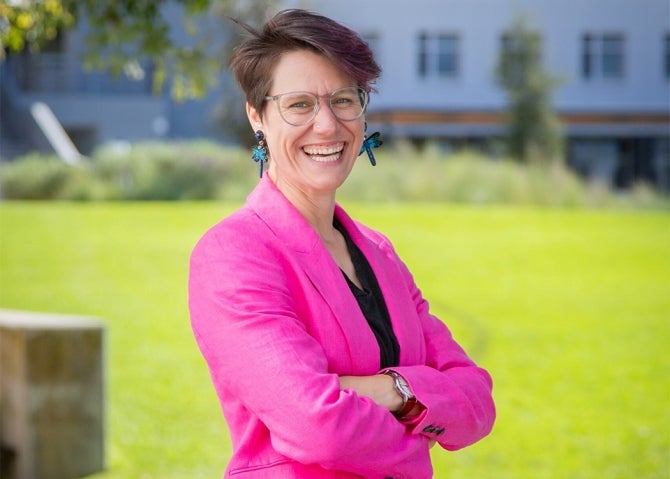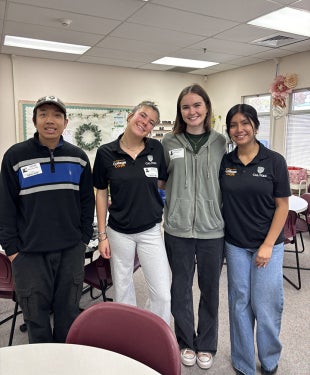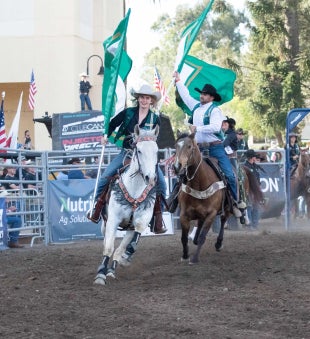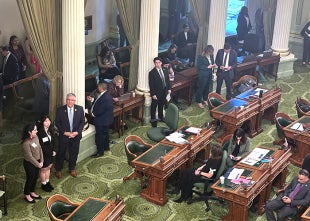Cal Poly, CSU Monterey Bay Team up on $750,000 National Science Foundation Grant on Equitable Data Science Collaborations

Contact: Nick Wilson
805-235-8008; nwilso28@calpoly.edu
The goal of the three-year research effort is to develop teaching tools that remove ‘power dynamics’ among students in collaborative projects in computer science and STEM courses
SAN LUIS OBISPO — Cal Poly was awarded a $750,000 grant, to be shared with California State University Monterey Bay, to assess equitable teaching and learning practices related to data science education.
The National Science Foundation recently awarded the funding through its Improving Undergraduate STEM Education (I-USE) initiative.
The Cal Poly arm of the I-USE project is led by Allison Theobold, assistant professor of statistics; Cal State Monterey Bay’s arm is led by statistics Professor Judith Canner. The three-year grant will investigate “pair programming,” a pedagogical learning tool that is often used in computer science and other STEM courses.
During a typical pair programming session, a team of two students would sit side-by-side and perform a computer programming task together. During these tasks, students are assigned to either the “driver” or the “navigator” role. The driver is responsible for writing code that addresses the given task, whereas the navigator reviews the code to ensure it is responsive to the problem at hand.
“The problem with pair programming is that, while it results in some good learning outcomes, there’s often an inherent power dynamic,” Theobold said. “One person’s ideas can be perceived as better than another’s.”
With this imbalance, Theobold said women and people of color frequently are not given positions of authority nor are they perceived to be contributing meritorious ideas.
The grant will investigate how data science educators can facilitate or create an environment that makes the pair programming collaborations more equitable for everyone.
The studies, to be conducted at the two CSU campuses, will involve an analysis of audio-recordings of classroom interactions between peers to assess the effectiveness of pair learning, and how educational methods can be improved to ensure equity.
“You can think about when two people are talking, if one person often is saying ‘Your idea sounds great,’ then you start to question if that person is actually sharing their own thinking,” Theobold said. “Through qualitative research, we’ll dig into what is actually being said, and how to assess how well someone is learning and feeling empowered to express their thoughts and ideas.”
Cal Poly and Cal State Monterey Bay students will be involved in a collaborative team to analyze the recordings. Students will receive training in qualitative analysis and will participate in mini conferences, visiting respective campuses, to hear about these analyses from other students. Students will also be involved in writing and disseminating the research results.
“Over the first two years of the grant, we’ll be able to examine students’ interactions to re-design, test, and evaluate what pedagogical practices lead to the most equitable collaborative experiences for every student,” Theobold said. “In the third year, we plan to do professional development for instructors who use computing tools in their classrooms to share what we’ve learned from our research, and to help instructors make a plan for how they might use some of these tools in the context of their classrooms.”
Theobold said their research will lead to academic journal papers, presentations at conferences, professional development facilitation and the creation of a website with resources related to equitable pair programming.
To learn more about Cal Poly’s portion of the I-USE grant.
Photo: Allison Theobold, Cal Poly assistant professor in statistics.
Photo by Alexis Kovacevic



